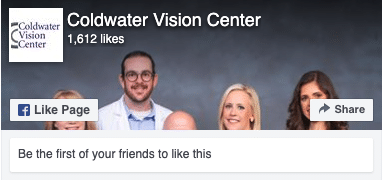For many individuals, contact lenses offer satisfying vision correction and better convenience than regular eyeglasses.
Benefits of Contact Lenses
Contact lenses have a few benefits:
- Improved vision clarity
- Aesthetics with freedom from having to wear eyeglasses
- Enhanced visual performance in physical activities
When you’re not wearing glasses, you’re free to enjoy these things in new ways.
Types of Contact Lenses
Here at Coldwater Vision Center, our Optometrist can recommend the best contact lenses for your situation based on a thorough eye exam and a review of your visual requirements for both work and play. There are various types of contact lenses to choose from, including:
1. Soft Lenses
These are comfortable to wear and you need to replace them daily, bi-weekly, or monthly depending on which type you select. Our Optometrist recommends soft lenses for sports since they fit closer to your eye and are hard to dislodge. They can offer correction for most prescriptions which include bifocal and astigmatism. These days, with the introduction of silicone hydrogels and other newer materials that allow oxygen to your eye, it’s easier to comfortably wear soft lenses. Soft lenses are also available in a variety of forms, including bifocal and multifocal contact lenses.
2. Gas-Permeable (GP) Lenses
GP lenses are made of moderately flexible plastics and correct many vision issues and provide sharp vision. They provide more durability than soft contact lenses and can be simpler to care for and handle, but require a longer adaptation period and to maintain adaptation, more consistent wear.
3. Color Contact Lenses
Improve your eye color or completely change it with color contact lenses available through opaque, enhances, and visibly-tinted contact lenses. These come in a variety of colors for both dark and light eyes, but should be prescribed by an optometrist.
4. Scleral Contacts
These are large-diameter gas permeable lenses designed specifically to vault over the whole corneal surface and rest on your eye sclera (white). If you have an irregular corneal surface, you’re an ideal candidate for scleral contacts.
5. Others
Contact lenses are also available in
- Daily wear
- Extended wear
- Hard
- Disposable
- Toric
- Bandage lenses
- Contacts for presbyopia
- Orthokeratology (Ortho-K)
- Decorative (Plano) Contact Lenses
Exam and Fitting for Contact Lenses
Before you’re fit with contact lenses, the doctor will perform a thorough eye exam. In this exam, they’ll determine what your prescription is for corrective lenses (for eyeglasses), and will check for any eye health issues that could interfere with you wearing contact lenses successfully.
If everything looks good during this exam, you’ll then set up an appointment for a consultation and fitting for your contact lenses.
Just like one size shoe won’t fit all types of feet, on size contact lenses won’t fit all eyes. If the contact lens’ curvature is too steep or too flat for the shape of your eyes, you might experience some discomfort or it could even damage your eyes. There are certain measurements the doctor will take to determine the best size for your contact lens for your eyes, including:
Corneal Curvature
The doctor uses a tool called a keratometer for measuring the curvature of the cornea of your eyes. This measurement will help the doctor choose the best diameter and curve for your contact lenses.
If the surface of your eyes is found to be a bit abnormal due to astigmatism, you might need a special lens design called a “toric” contact lens. In the past, only gas permeable lenses were able to correct astigmatism. But these days, there are various brands of soft toric lenses that are available in:
- Extended wear
- Disposable
- Colored
- Multifocal
Mapping
Sometimes, you may require a detailed mapping of your cornea surface (known as corneal topography). This provides very precise details about your cornea’s surface characteristics and creates a map of the surface of your eye with various contours that are represented by different colors.
Pediatric Contact Lenses
Coldwater Vision Center also provides contact lenses that fit children with aphakia. This is where they have no crystalline lens secondary to surgical cataract removal.
You may be amazed that your young child can tolerate contact lenses. It’s not only possible, with diligence, but also very beneficial to your child. The goal is to provide both outstanding care and empowering you to be involved in caring for their lenses. We’ll work closely with you to help rehabilitate your child’s eyesight to the highest possible level, as well as guide you along the way in your goal.
Contact lenses-related infections are rare, but could occur. This is typically due to an association with improper wear like poor cleaning, overuse, swimming, or sleeping in lenses. To check for problems with contacts, you would want to check for light sensitivity, pain, excess discharge, watering, redness, or blurred vision. If you notice any of these signs, you’ll want to remove the contact lenses and bring your child to our office right away.
Visit Coldwater Vision Center for a Contact Lenses Evaluation and Fitting
Innovations in technology in the manufacture and design of contact lenses has made them a significantly popular choice at Coldwater Vision Center for both adults and younger patients.
If you’re interested in getting contact lenses, contact us by calling 662-622-5173 for our Coldwater location or 662-224-8000 for our Ashland location.

